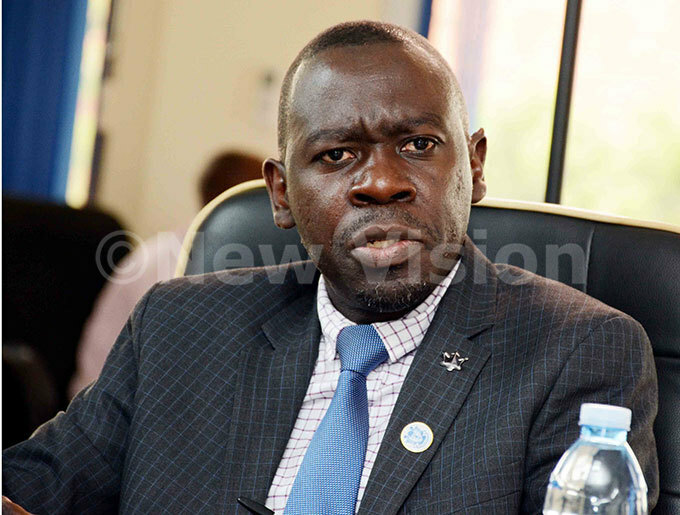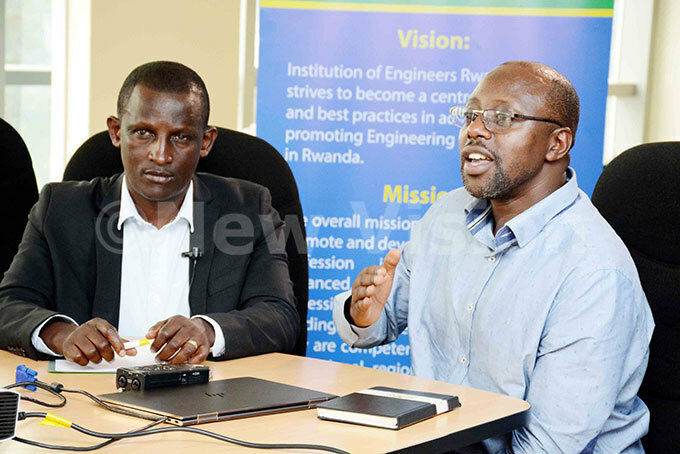EAC engineers demand to be included on big donor projects.
The engineers in the region feel that they have been sidelined when it comes to employing professionals on most big projects and instead all contracts have been given to foreigners.
PIC: Eng. Nicholas Musuni, registrar, Engineers' Board of Kenya.Photo by Eddie Ssejoba
Engineers in the East African Community (EAC) have appealed to the regional states to change the system used in awarding donor-funded projects and include local professionals.
The engineers in the region feel that they have been sidelined when it comes to employing professionals on most big projects and instead all contracts have been given to foreigners.
Eng. Michael Daka, the managing director of Process Limited, an engineering consulting firm in Ntinda, Kamapala said that engineers in the EAC region were at a disadvantage after most governments started negotiating with donors, who dictate who to do the designing, construction and supervision, always preferring to bring their own people.

Eng. Michael Daka, managing director Proess Limited, Ntinda Kampala
"Most big projects funded by donors or implemented using loans have been awarded to foreign firms that employ their own workers, the local engineers are not anywhere on these big projects yet we need to gain skills and experiences," he explained.
He cited several examples of recent projects funded by Chinese and Japanese governments throughout the region, including construction of rail lines, ports, hydro power dams, road works, bridges and several others where local engineers have been left out.
"We were embarrassed when we were invited to visit Karuma Dam and we were taken around by foreign engineers, we could not find any local skilled employee apart from casual labourers," he noted, adding that the new trend by EAC states is that the donors provide the funding plus the skilled workers and leave out the locals.
He said although most local engineers lacked the capacity and financial muscle to undertake big contracts, the regional states should re-negotiate with donors to include local professionals or partner with them on every big project to enable them gain experience.
"The EAC should press partner states to ensure local engineers participate in big projects like construction of dams and bridges and build capacity to foster growth and progress," he said.
Eng. Daka appealed to regulatory bodies in partner states to harmonise qualifications of professionals under the Mutual Recognition Agreements (MRA) to ensure smooth movement of services within the region.

He said although each respective board of engineers is supposed to accept recommendations from a sister body from partner state to allow engineers offer services, some bodies have back-tracked and started questioning universities or academic qualifications of applicants that have been endorsed.
"I think MRA should not question the curriculum behind some certificates as long as they have been approved by a sister board in the country of origin," he said.
He asked the Tanzanian authorities to ease on the process of getting a work permit, saying getting a recommendation through MRA should give an automatic qualification to getting a permit. He said some Ugandans on an exchange programme had taken two years without getting a work permit.
Eng. Nicholas Musuni, the registrar of the Engineers' Board of Kenya however appealed to Burundi and South Sudan to sign the MRA to reap from its benefits like other partner states.
He said it was MRA that was pushing the agenda of engineers in the region, where in addition members share information and knowledge.
He said MRA had helped to create a strong institution in Rwanda that assesses engineers. "MRA is strengthening the engineering profession in EAC and we hope to get full benefits of opening up our borders," Eng. Musuni stated.
He said the EAC secretariat was working with immigration authorities of some partner states to streamline the process of acquiring work permits, saying under the MRA, the process should be automatic.
Rwanda however appealed to partner states to recognise engineering graduates, technicians and technologists under MRA to enable them enjoy the full benefits.
Eng. John Kalamagye, the registrar of the Institute of Engineers said engineers don't work alone so, others work under them should as well be regulated and bound by the MRA so that in case of any shortcoming, they too would be reliable.
The president and chairman of the governing council of the Institute, Eng. Papias Kazawadi said engineers should make it clear to their governments that they are not happy with all the big projects going to foreigners.
He said they too needed to be considered for work on big donor-funded projects to enable them gain skills. He asked governments to state in the Memoranda they sign with the donors that in order to build capacity, local engineers must be included or sub contracted.